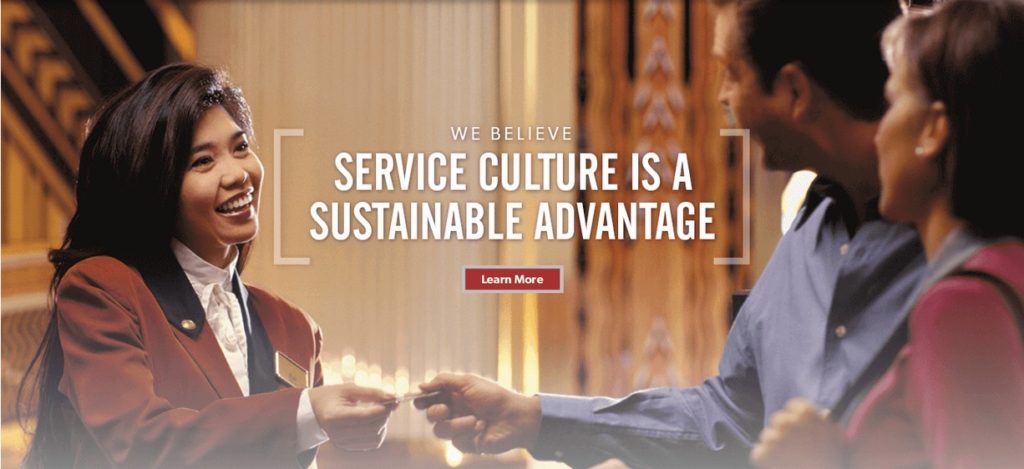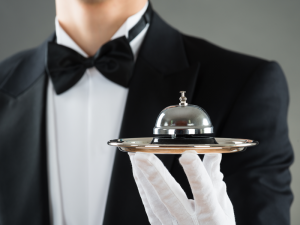Our previous blog post demonstrated the power of customer voice in an unsolicited book review from a technology industry guru. This post makes the same point, but for the travel and hospitality – one of the most traditional “service” industries on the planet. Read on…

Customer loyalty is a powerful marketing force that travel and hospitality businesses are always chasing.
By David Harrington
But a whole other degree of devoted customer exists: The brand evangelist, described as the kind of traveler who feels so connected to a company that they proactively share their positive experiences with others.
In today’s connected world, customer service experiences — especially the bad ones — often spread like wildfire. For airlines, hotels, resorts and other companies in the travel and hospitality industry, this presents new challenges in terms of managing their reputation. However, smart companies see this as an opportunity to create brand evangelists.
Good or bad, social media massively amplifies the word-of-mouth effect. Companies ahead of the curve recognize the critical role that customer service plays in winning people over, and the best travel and hospitality brands are stepping up their game with white-glove service and concierge contact centers to transform travelers from simply being loyal, to being proactive brand advocates.

The rise of white-glove customer service
Technology today is expanding the definition (and capabilities) of white-glove service for travel and hospitality brands across the board. “White-glove service is about four things: personalization, memorization, anticipation and response to requests,” advises Ron Kaufman, consultant and New York Times bestselling author of Uplifting Service. “Personalization and memorization deal with the fact that airlines or hotel brands should already know something about who I am and what I like.”
Kaufman goes on to observe that hospitality brands are realizing the need to examine and improve their performance in the area of anticipation. “Take hotels, which [often] don’t anticipate any future travel needs at checkout. It would be so simple to let the next hotel know that I prefer a certain pillow type, for instance, and have those pillows waiting for me along with a note from housekeeping confirming my preference,” he says.
Using information about a specific request to anticipate future ones is critical in an era where on-demand apps and 24-hour access to brands are raising customers’ expectations. “Customers are delighted when brands care more about them than how much they’re paying and what time they’re checking out,” Kaufman says. “Things like offering local restaurant reservations or preparing business documents ahead of a meeting — this is white glove, personalized, concierge-level service that can, and should, be provided to most travelers.”
Turning loyalty members into evangelists
In its 2017 travel and hospitality outlook, Deloitte predicts that customer experience will make a much bigger impact than loyalty programs on customer retention. Dave Murray, senior customer experience consultant at the DiJulius Group consulting firm, agrees.“Consumers aren’t going to continually subject themselves to poor customer service or experience just because there’s a free flight or stay at the end of the tunnel,” says Murray.“Organizations can have great rewards programs, but it’s not sustainable long-term if the service is poor.”
Kaufman points to a resort brand based out of Mauritius called LUX*, whose vision for its loyalty members is to make every moment matter. “At LUX*, they’ll keep track of things like whether loyalty members did yoga or signed up for an art class,” he explains. “So, when they arrive on their next stay, there’s a yoga mat or even art supplies waiting for them in the room,” says Kaufman. “If you travel with kids often, they might put some toys in the room. Those are exactly the kind of customized things that brands can do to create evangelists. That’s not about points or perks, that’s about the special experience that members will positively associate with that brand,” he says.
The contact center as a concierge
The merging of contact center and concierge functions — such as making restaurant reservations, booking entertainment and coordinating local transportation — is already taking place today.
Travel brands are combining the two functions to provide highly personalized and differentiated service when people call in for support. “Under the old paradigm, customer service was considered ‘playing defense,’” says Murray. “The call center was there to defend what went wrong, and figure out how to make people happy again. Today there’s a shift, where hospitality brands want call centers to drive the customer relationship, anticipate future needs and offer personalized service.”
What’s more, travel brands that focus on call center service can significantly impact revenue per traveler, also known as “Revenue Management” in the travel industry, says Dr. Kevin Murphy, the hospitality department chair at University of Central Florida’s (UCF) Rosen College of Hospitality Management. For instance, airlines face low profit margins per customer due in large part to massive overhead costs, but Allegiant Airlines is successfully leveraging their call center to become one of the highest-margin carriers in the United States.
If a customer calls Allegiant about an issue regarding an upcoming flight to Orlando, for example, the call center agent might try to up-sell a car rental along with tickets to Disney World. Although this isn’t a direct sale of an Allegiant product or service, they still take a cut of the revenue. “That’s where [Allegiant’s] incremental profits come from,” Murphy notes. “Revenue management is basically the art of providing great guest service, and combining it with the art of making additional sales over time.”
For Kaufman, creating a concierge contact center is about giving agents the tools they need to get a 360-degree view of the customer, and empowering them to think independently and experiment. “You need to create a culture inside that concierge contact call center where people can try new things, then share what worked and what didn’t,” Kaufman advises. “Brands shouldn’t be compulsive about everybody having to follow a script. Passengers and customers know when somebody is scripted, and that’s not what they’re looking for,” he says. “Travelers want real, human interaction. Agents need the freedom to try different conversations, up-sell and cross-sell ideas with customers on the fly.” That requires engaged team members who feel a real connection for the brand they’re representing.
Customer service and storytelling
At its core, brand evangelism is shared through stories. “If you go online and see something rated highly with lots of five-star reviews — whether it’s a hotel, resort, airline or even Amazon.com — you still look at the reviews,” concludes Kaufman. “What you’re looking for is ‘What’s the story?’ What happened to that person, and is there something in that story that sounds like, feels like or could have been me?”
Kaufman says that travelers love to tell those customer service stories, and they’re highly relatable, because so much about travel is universal. And as the positive stories pile up, they begin to pay dividends over time, especially online. “That’s exactly why improved service translates into hospitality brand evangelism,” Kaufman says.
This article was originally published on the Telus International website.



